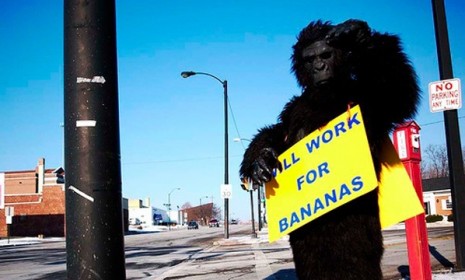Is a bad job worse than no job?
That's one conclusion from a new study on mental health. Isn't having a job supposed to make you happier?

Researchers — and anyone who's ever been out of a job for a long time — can tell you that unemployment is hard on your emotional well-being. Now, a new study has found that having a bad job can be just as damaging, or worse, for your mental health. Here, a brief guide to the findings:
What exactly does the study say?
Researchers at the Australian National University in Canberra looked at seven years of mental health profiles of 7,155 working-age Australians. Using a common five-item Mental Health Inventory, they found that employed people had an average score of 75.1, while unemployed people averaged 68.5. Remaining unemployed lowered the mental health score by 1.1 points, but getting a poor-quality job dropped it 5.6 — suggesting that a bad job may be worse for your mental health than having no job at all.
The Week
Escape your echo chamber. Get the facts behind the news, plus analysis from multiple perspectives.

Sign up for The Week's Free Newsletters
From our morning news briefing to a weekly Good News Newsletter, get the best of The Week delivered directly to your inbox.
From our morning news briefing to a weekly Good News Newsletter, get the best of The Week delivered directly to your inbox.
What constitutes a bad job?
According to the study, a low amount of control over decision-making, high demands, job insecurity, and the perception of being underpaid. Of course, what constitutes unfavorable working conditions "is in the eye of the beholder, and can include anything from a less-than-stellar salary, cold workplace, to a brutal boss," cautions Stephanie Taylor Christensen in Business Insider.
Are these findings really a surprise?
Yes. Psychologists and policymakers have long assumed that the structure and sense of purpose of a paid job is unambiguously good for mental health. "Work-first policies are based on the notion that any job is better than none, as work promotes economic as well as personal well-being," say researcher Peter Butterworth and his colleagues. That needs to be rethought.
A free daily email with the biggest news stories of the day – and the best features from TheWeek.com
What are the lessons here?
"People who are unemployed or stuck doing lousy work should seek new positions that offer more security, autonomy and a reasonable workload," says Hans Villarica in TIME. Granted, "that's a lot easier said than done," but employers should take note that "happier employees are a benefit" to their company or institution. Also, the researchers note that the findings may not be universal, since Australia's safety net for the jobless includes free or low-cost health care, as well as stipends.
Is anyone worse off than those with lousy jobs?
Maybe, just maybe, the super rich are, says Boston College researcher Robert A. Kenny, whose as-yet unreleased study looks at the "secret fears" of 165 households worth an average of $78 million. Those fears include always being "expected to give really good presents" and losing "the right to complain about anything." Yeah, "I'll bet they're not staring into the abyss quite as desperately as [the subjects in the Australian survey], says Frederick E. Allen in Forbes.
Sources: HealthDay, TIME, Bloomberg, CBC News, Forbes, Business Insider, The Atlantic
-
 Le Pen back in the dock: the trial that’s shaking France
Le Pen back in the dock: the trial that’s shaking FranceIn the Spotlight Appealing her four-year conviction for embezzlement, the Rassemblement National leader faces an uncertain political future, whatever the result
-
 The doctors’ strikes
The doctors’ strikesThe Explainer Resident doctors working for NHS England are currently voting on whether to go out on strike again this year
-
 5 chilling cartoons about increasing ICE aggression
5 chilling cartoons about increasing ICE aggressionCartoons Artists take on respect for the law, the Fourth Amendment, and more